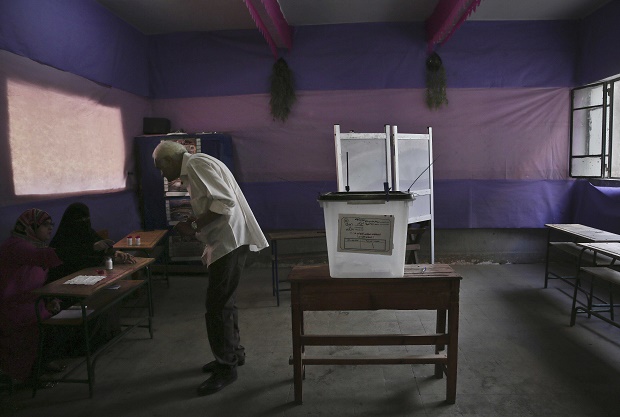
An Egyptian man speaks to election workers during the runoff of the first round of the parliamentary election, in Al-Haram in Giza, a neighboring city of Cairo, Egypt, Tuesday, Oct. 27, 2015. AP
CAIRO — Egyptians trickled to the polls Tuesday in just over half of the country’s 27 provinces in parliamentary runoffs that are part of an election process dubbed as the final transition to democratic rule but that apparently failed to inspire voters.
More than 200 of the legislature’s 596 seats are up for grabs in the two-day balloting in 14 provinces, ending Wednesday. Voting was also held in Cairo’s twin city of Giza and the Mediterranean port city of Alexandria.
Voting in the remaining 13 provinces will be held next month and the legislature is expected to hold its inaugural session in December.
The election’s first round last week had a turnout of 26.56 percent — about half of the turnout in the last parliamentary election held in late 2011 and early 2012, which produced a chamber dominated by Islamists.
It’s too early to predict turnout in the Tuesday-Wednesday runoffs, but local news footage from polling centers in most of the 14 provinces showed a handful of voters in some and none at others.
It was in sharp contrast to the long lines outside polling centers in the 2011-12 vote.
Even if turnout does not fall below that of the first round, questions will persist on the political direction of the country under Abdel-Fattah el-Sissi, the country’s general-turned-president elected last year.
Women and the elderly made up most of the voters who showed up Tuesday. Young voters were conspicuously absent, possibly reflecting growing disenchantment with el-Sissi’s rule.
The next parliament, widely expected to be subservient to el-Sissi, will be the first since the Islamist- dominated chamber was dissolved in 2012 by a court ruling. This is also the first parliamentary election since el-Sissi, as military chief, led the 2013 overthrow of Egypt’s first freely elected president, the Islamist Mohammed Morsi, following mass street protests against his rule.
The election comes at a time when el-Sissi’s government is struggling to keep the nation’s ailing economy afloat in the face of a slide in the value of the Egyptian pound and a shortage of foreign currency needed to finance vital imports. His government is also under scathing attack for its failure to prepare for or effectively deal with severe flooding in Alexandria that left six people dead after a weekend rainstorm.
The vote also took place as security forces struggle to contain an insurgency by Islamic militants in the Sinai Peninsula and in a climate of fear rooted in the continuous erosion of freedoms and a harsh crackdown against Islamists that has left hundreds killed in street clashes and thousands jailed since 2013.
A US-based Egyptian scientist who had criticized the military over its claims of a medical breakthrough has complained that authorities cancelled a talk on the planet Mars that he planned to give at Alexandria University, citing security reasons. The University has denied this, saying it was not given sufficient notice for Essam Heggy’s lecture.
On Sunday, el-Sissi amended prison regulations to allow prison personnel to use force against inmates who resist orders based on laws or regulations, beyond the previously authorized use of force for self-defense and to prevent an escape.
Pro-democracy activists, meanwhile, launched a campaign on social media Tuesday to coincide with the runoff, calling for the release of Alaa Abdel-Fattah, one of the country’s most prominent liberal bloggers who is serving a five-year prison sentence.
His mother, mathematician Laila Soueif, and two sisters, activists Mona and Sanaa, on Tuesday staged a rare protest outside el-Sissi’s palace in the Cairo suburb of Heliopolis to call for his release. El-Sissi is currently on a foreign trip.
Abdel-Fattah was convicted of violating a law adopted in late 2013 that placed draconian restrictions on street demonstrations, after he took part in a protest against the military’s right to try civilians before its tribunals. Abdel-Fattah and three others are the only ones among more than 20 people convicted in the same case who were not included in a presidential pardon for 100 prisoners issued last month. They included Abdel-Fattah’s sister Sanaa.
The prisoners, mostly liberal activists who fueled the 2011 uprising against autocrat Hosni Mubarak, came ahead of el-Sissi’s visit to New York to attend meetings of the U.N. General Assembly.
RELATED STORY
Islamist candidate in Egypt elections shot dead in Sinai